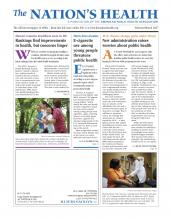Although a decade has passed since global leaders adopted a treaty to protect the rights of people with disabilities, many of the world’s countries are lagging on constitutional measures to support that promise.
As of December, only 24 percent of countries around the globe had constitutions that guaranteed equal rights for people with disabilities or prohibited discrimination, according to the World Policy Analysis Center at the University of California-Los Angeles’ Fielding School of Public Health. Among those that are lagging is the United States, according to the center.
While the Affordable Care Act has reduced barriers to health care for people with disabilities by prohibiting discrimination by insurers based on pre-existing conditions, the U.S. Constitution “does not explicitly grant equal rights to persons with disabilities — a critical gap that needs to be addressed,” according to Jody Heymann, MD, PhD, founding director of the center and dean of the school of public health.
“The United States has strong laws guaranteeing equal rights in education, work and civic life, which have led to dramatic progress in our lifetime,” Heymann said in a news release. “However, particularly as the ACA and other laws are facing new threats, the importance of a foundation of constitutional equal rights is clear.”
In 2006, the United Nations adopted the Convention on the Rights of Persons with Disabilities to improve the lives of the more than 1 billion people worldwide who have disabilities. The treaty spells out the rights of people with disabilities — such as equal recognition before the law, respect for privacy and the right to live in the community — and calls on countries to promote, protect and ensure those rights. The treaty was signed by 160 parties, including the United States, and entered into force in 2008.
Since then, “remarkable progress has been made in advancing the rights of persons with disabilities in society and development,” according to the U.N. Division for Social Policy and Development Disability. The United Nations and stakeholders have been working to mainstream the rights and needs of people with disabilities and bring the issues to the forefront in global discussions. The 2030 Agenda for Sustainable Development, released in 2015, includes new global development goals that include people with disabilities.
Despite the gains that have been made, the lack of constitutional-level protections puts people at risk, according to the World Policy Analysis Center report. The center examined constitutions around the world, finding that only 26 percent explicitly guarantee the right to health for people with disabilities, for example. People with disabilities often encounter barriers to health care, such as poor treatment, lack of transportation and affordability. As such, they may forgo care and experience poorer health.
The center also found that:
fewer than 10 percent of countries constitutionally guarantee civil rights to people with disabilities;
just 18 percent of countries constitutionally protect the right of people with disabilities to work; and
only 28 percent of countries constitutionally protect the right to education for children with disabilities.
For more information, visit www.worldpolicycenter.org.
- Copyright The Nation’s Health, American Public Health Association









